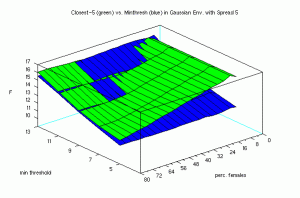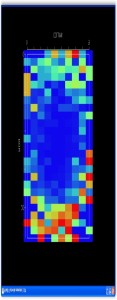 Social behaviors involve complex give-and-take between animals, as well as interactions with the environment. To explore these interactions and generate new hypotheses about the control of behavior, we have developed computational models of social behavior. These biologically-plausible models test theoretical predictions about mechanisms of behavior modulation and the social consequences of behavior. Our models use “agent-based simulations” to explore multiple levels – from the molecular level of the neuronal synapse to that of social behavior interactions among many animals. The model thus incorporates research results from the field of neuroscience (on the neuroendocrine control of behavior) all the way through to results from the fields of ethology and ecology (about the social dimensions of behavior). We are currently focusing on the display of aggressive and mate choice behaviors. We expect these models to generalize to other species (including humans) and yield insight into normal social behaviors, as well as predict treatments for conditions where social behavior goes awry.
Social behaviors involve complex give-and-take between animals, as well as interactions with the environment. To explore these interactions and generate new hypotheses about the control of behavior, we have developed computational models of social behavior. These biologically-plausible models test theoretical predictions about mechanisms of behavior modulation and the social consequences of behavior. Our models use “agent-based simulations” to explore multiple levels – from the molecular level of the neuronal synapse to that of social behavior interactions among many animals. The model thus incorporates research results from the field of neuroscience (on the neuroendocrine control of behavior) all the way through to results from the fields of ethology and ecology (about the social dimensions of behavior). We are currently focusing on the display of aggressive and mate choice behaviors. We expect these models to generalize to other species (including humans) and yield insight into normal social behaviors, as well as predict treatments for conditions where social behavior goes awry.
 Project in collaboration with Dr. Matthias Scheutz, Department of Computer Science, Tufts University
Project in collaboration with Dr. Matthias Scheutz, Department of Computer Science, Tufts University
His lab: http://hrilab.cs.tufts.edu/
Read two papers about this project:
Giordano B. S. Ferreira, Matthias Scheutz, Sunny K. Boyd. (2018) Mate choice strategies in a spatially-explicit model environment. PLoS ONE 13(8): e0202680.
Scheutz, M., Harris, J., and Boyd, S.K . (2010) How to pick the right one: investigating tradeoffs among female mate choice strategies in treefrogs. FROM ANIMALS TO ANIMATS 11; Book Series: Lecture Notes in Artificial Intelligence. Editor(s): Doncieux S; Girard B; Guillot A; Hallam J; Meyer JA; Mouret JB. Volume: 6226 Pages: 618-627.

